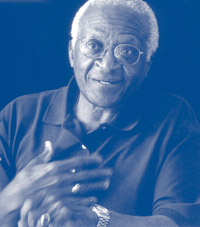|
|
|
Archbishop Tutu Addresses UW Forum on Health of the World’s Children
|
|
|
 |
|
|
Archbishop Desmond Tutu
|
|
|
|
|
|
|
|
Nobel Peace Laureate Desmond Tutu, Anglican archbishop emeritus of Cape Town, South Africa, spoke at the University of Washington in May 2002 at a campus forum on advancing the health of the world’s children.
Other panelists called for practical measures to deal with children’s health issues and with systemic poverty and economic inequity. Tutu commended the UW’s efforts directed toward research and training on HIV/AIDS. For the most part, however, his remarks were pitched at a moral ground. To his audience of faculty members, staff and students, he presented a fundamental reason to care about Africa.
“It is the logic of being human,” said Tutu. “We cannot be human on our own. We can be human only together.”
“You are not your brother’s keeper,” he added. “You are your brother’s brother.”
Tutu’s presence generated considerable attention for the forum. He established his international reputation as an advocate for a nonviolent struggle against apartheid in South Africa. He received the Nobel Peace Prize in 1984.
Three other speakers contributed complementary expert views to the health forum panel.
Dr. Stephen Gloyd, associate professor of health services in the School of Public Health and Community Medicine, has spent 20 years working in Africa on public health programs. He spoke of the pressing need for richer nations to forgive the oppressive debt of the poorest countries. He sharply criticized the economic structural adjustment programs imposed on ailing countries by the World Bank and International Monetary Fund.
“These policies represent America’s response to development and they are crippling Africa and its children,” Gloyd said.
Dr. King Holmes, professor of medicine, director of the UW Center for AIDS and Sexually Transmitted Diseases, and head of the section of infectious diseases at Harborview Medical Center, detailed the enormous impact of HIV/AIDS on children in Africa. Holmes pointed to UW research demonstrating that relatively inexpensive and basic measures could significantly reduce the transmission of HIV/AIDS from mother to child. He urged, above all, more attention to preventive work among adolescents.
“The basic education and empowerment of adolescents and pre-adolescents, especially girls, to avoid HIV exposure may be the best hope for reducing the childhood burden of HIV,” Holmes said.
Dr. Bolanle Oyeledun, who runs United States-funded reproductive health programs in Nigeria and is a Packard-Gates Population Leadership Fellow at the UW, spoke also of protecting vulnerable adolescents. She called for a partnership between Africa and the wealthier nations.
“We need to mobilize for change,” said Oyeledun, “We cannot continue as we are. We cannot move forward alone.”
After the health forum, at a lively ceremony before a large, enthusiastic audience in Meany Theater, Tutu was awarded the first honorary degree bestowed by the UW since 1921.
|












